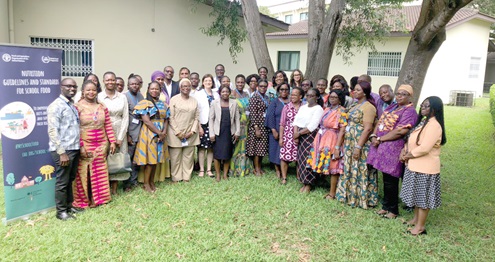
Fill nutrition gap in children - Stakeholders advocate
Stakeholders have underscored the need to design a comprehensive policy to fill the nutrition gap in children and enhance the quality of school feeding programmes and nutrition outcomes in the long- term.
Advertisement
That, they said, would address issues of food security and malnutrition, and improve the nutrition guidelines and standards for school meals in Ghana. They said a holistic approach to school nutrition was, therefore, necessary, integrating various interlinked areas to promote healthy school environments, food systems and nutrition education.
The stakeholders were speaking at a workshop organised by the Food and Agriculture Organisation of the United Nations (FAO) and the World Food Programme (WFP) in Accra.
The project was on the theme: "School Food Nutrition Guidelines and Standards for Safeguarding Children and Adolescents' Right to Food." It was designed to improve children's diets and enhance the recognition and civil awareness of adequate school meals.
The workshop follows after the FAO-WFP launched its project in 2022 and finalised the initial phase of assessments in selected districts of Kassena Nankana, Kintampo -North and Hohoe Municipal.
It aimed to validate a set of school meal assessment findings and revise the existing school meal nutrition guidelines and standards (NGS). It was also to test the applicability of the NGS FAO-WFP global methodology.
The Senior Nutrition and Food Systems Officer of the FAO, Mphumuzi Sukati said it was estimated that there would be about four million increase in the number of people who would be food insecure between June and August 2024, as compared to November 2023.
That, he said, represented a fourfold increase over the last five years. The food crisis, he said, was driven by economic issues, rising inflation, currency devaluation, high productivity and other obstacles affecting the food security situation in the region.
Mr Sukati said malnutrition in West and Central Africa was high, with 16.7 million children under five acutely malnourished and more than two out of three households unable to afford healthy diets.
He said eight out of 10 children, aged six to 23 months, did not consume the minimum number of foods required for optimal growth and development.
That, he said, made most malnourished children carry their nutritional problems into school, thereby affecting their cognitive and physical potential and their overall development.
Malnutrition
“Malnutrition in childhood has been proven to reduce productivity when these children become adults and reduce their chances of having better income and better lives,” he said.
Mr Sukati said the organisation was committed to continue supporting the government in improving its school feeding programme and integrating nutrition education. He said it would work together with partners such as UNICEF and WHO to strengthen the country’s agricultural and food systems to benefit schoolchildren.
He, therefore, called on all stakeholders to work together to achieve the sustainable development goals, as well as bring together the continent into a sustainable growth path while leaving no one behind. “
Sustainable solutions
The Representative and Country Director of the WFP, Accra Ghana, Babara Tulu Clemens, emphasised the need for sustainable solutions to ensure children's growth and education as the foundation for a nation's future.
She highlighted the importance of nutritious meals in schools, saying “there is a need for collective action from diverse partnerships to address the lack of access to nutritious meals for many children in Ghana and other countries.”
Provision
The National Coordinator of the Ghana School Feeding Programme, Hajia Safia Mohammed, said the programme supplied a single hot and nutritious meal to 3,801,500 pupils in public primary and kindergarten schools across the country.
She said the GSFP currently provided one meal per each school-going day for about 3.9 million pupils in deprived areas of the country and indicated that the nutritional component was a challenge.
The national coordinator said the GSFP was committed to continuing to implement training programmes to sensitise district actors to using meal planners and developing nutritious menus.
She, therefore, expressed the hope that the guidelines would refine the GSFP menus and other activities to suit specific contexts, ensuring effectiveness and efficiency.
Advertisement




